
As I mentioned in yesterday's Nugget, you can't use brute force SEO procedures to get your website ranked any more. This means you can't pay someone to set up a lot of inbound links to your site, and you can't set up several pages which overuse specific word phrases so you can rank for them.
As of today, the recommended strategy by Google is to create content and post it as blogs to your website and share it to social media (see "Google Primer" app available on smartphones). They also recommend that you write content that matches the phrases your customers search for.
Sometimes it's difficult to know the difference between how you think of your jewelry store and what your customers search for online. As an example, do you want to sell "bridal" or would you rather sell "wedding rings" and "engagement rings"? Honestly, should give up on selling "bridal" because it's a waste of your time.
Let's say that you do want to rank for "engagement ring." Instead of loading your website up with the that phrase dozens of times, you should list all the similar words and phrases associated with it, for example:
* engagement ring
* engagement rings
* engagement bands
* wedding ring
* wedding rings
* wedding jewelry
* wedding bands
With that list in hand, you would then write a blog post that uses all those phrases. Strive to write something that doesn't sound overly contrived or forced. It must be easy to read.
Before you start randomly writing new content for your website you should investigate which words Google sees on your site right now and how you are ranking for those words. For this you need to head on over to Google Webmaster Tools and look at your Search Queries and Content Keywords.
Let start with an investigation of Content Keywords report under the Google Index left navigation menu as shown here:
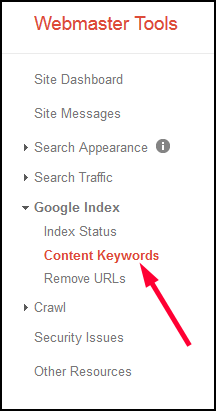
You will see a keyword list similar to this one:
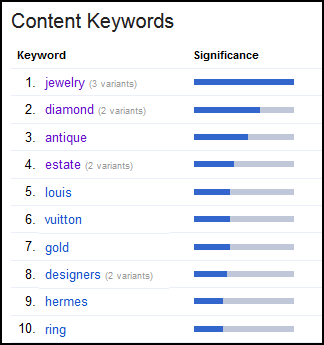
Your website is probably ranking best for the first 4 or 5 keywords shown in that list. Clicking on any of those keywords will show you the number of time that keyword was found on your website and the variations of that word found.
Here's what it looks like when clicking on the first keyword in that list, "Jewelry":
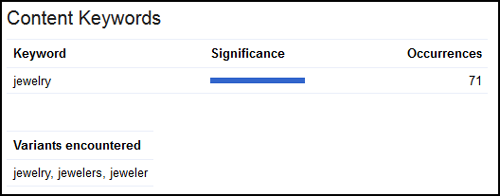
In that screen grab, you can see that Google groups the words "jewelry," "jewelers," and "jeweler" together. Take notice that those 3 words appear on this website 71 times. That might seem like a lot but it's really not. This particular website has only 39 pages, which means one of those "jewelry variations" appears on each page 1.8 times.
Even though this might seem like an overusage of the keywords, the truth is that they could probably use those variations at least another 71 times on the site without any type of penalty; after all, they are a jewelry store, so they won't get penalized for overusing a word which described their business.
The above list also shows the word "antique" without any variations. That word is used 39 times throughout their site. I will assume that word appears once on all 39 pages.
Now that you know where to find the list of top keywords you are using on your website, let's next look at how that translates to visibility in the search results. In Webmaster Tools, navigate to Search Traffic, the Search Queries on the left menu as shown here:
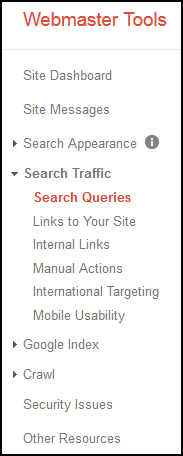
The report on that page will show you all the search queries that triggered the appearance of your website in search results. Sort the list by impressions by clicking the word "Impressions" at the top of the second column.
This is what my example looks like:
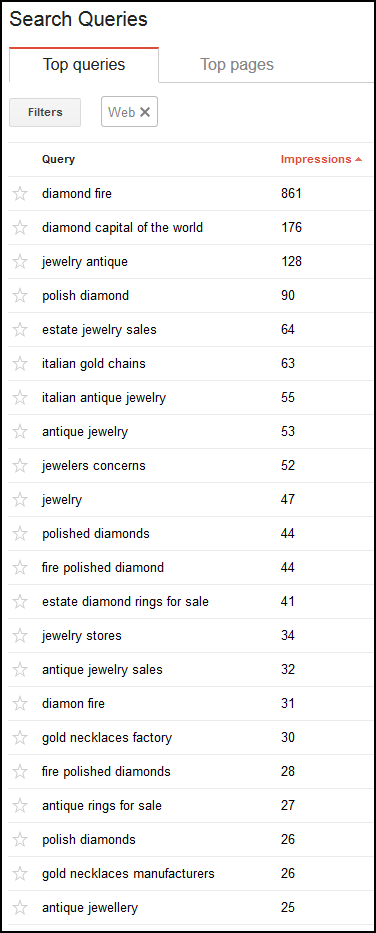
You can see that the phrases in this list closely match the list of words which appear most on your website.
You should carefully review the list of content keywords Google shows for your site. Try to figure out what's missing from their list that you would like to rank for, and then write some blogs or other pages to help attract those search queries.
The key take away from this Daily Golden Nugget is that Google can only rank you for the words it finds on your website. The particular website I used in this example isn't ranking at all for any of the 7 engagement ring or wedding ring phrases I mentioned above. That's simply because Google didn't find the words "engagement" or "wedding" anywhere on this particular site. That's easy to fix with a few new pages and a slight rewrite of a few other pages.








